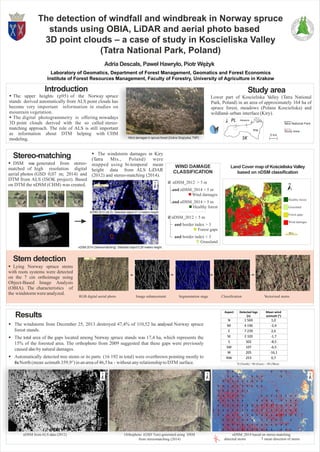Poster_2
- 1. Introduction ï§ The upper heights (p95) of the Norway spruce stands derived automatically from ALS point clouds has become very important information in studies on mountain vegetation. ï§ The digital photogrammetry is offering nowadays 3D point clouds derived with the so called stereo- matching approach. The role of ALS is still important as information about DTM helping with CHM modeling. 50 m nDSM 2012 (ALS). Selected object 21,3 meters height nDSM 2014 (Stereomatching). Selected object 0,28 meters height Study area Lower part of Koscieliska Valley (Tatra National Park, Poland) in an area of approximately 164 ha of spruce forest, meadows (Polana Koscieliska) and wildlandâurban interface (Kiry). Stereo-matching ï§ DSM was generated from stereo- matched of high resolution digital aerial photos (GSD 0,07 m; 2014) and DTM from ALS (ISOK project). Based on DTM the nDSM (CHM) was created. ï§ The windstorm damages in Kiry (Tatra Mts., Poland) were mapped using bi-temporal mean height data from ALS LiDAR (2012) and stereo-matching (2014). Vectorized stemsRGB digital aerial photo Image enhancement 15 m Stem detection ï§ Lying Norway spruce stems with roots systems were detected on the 7 cm orthoimage using Object-Based Image Analysis (OBIA). The characteristics of the windstormwereanalyzed. Segmentation stage ClassiïŽcation 5 km Tatra National Park Study area Wind damages in spruce forest (Dolina StrÄ Åžyska; TNP) Land Cover map of KoÅcieliska Valley based on nDSM classification WIND DAMAGE CLASSIFICATION if nDSM_2012 > 5 m and nDSM_2014 < 5 m Wind damages and nDSM_2014 > 5 m Healthy forest if nDSM_2012 < 5 m and border index > 3 Forest gaps and border index < 3 Grassland Healthy forest Grassland Forest gaps Wind damages 150 m Results ï§ The windstorm from December 25, 2013 destroyed 47,4% of 110,52 ha analysed Norway spruce forest stands. ï§ The total area of the gaps located among Norway spruce stands was 17,4 ha, which represents the 15% of the forested area. The orthophoto from 2009 suggested that these gaps were previously caused also by natural damages. ï§ Automatically detected tree stems or its parts (16 192 in total) were overthrown pointing mostly to theNorth(mean azimuth 359,9°)inanareaof46,5ha - withoutanyrelationship toDTM surface. nDSM fromALS data (2012) Orthophoto (GSD 7cm) generated using DSM from stereomatching (2014) nDSM_2014 based on stereo-matching detected stems mean direction of stems Aspect Detected logs (n) Mean wind azimuth (°) N 1 569 1,0 NE 4 196 -2,4 E 7 239 2,6 SE 2 320 -1,7 S 302 -8,5 SW 107 -6,5 W 205 -16,1 NW 253 0,7 The detection of windfall and windbreak in Norway spruce stands using OBIA, LiDAR and aerial photo based 3D point clouds â a case of study in Koscieliska Valley (Tatra National Park, Poland) Adria Descals, PaweÅ HawryÅo, Piotr WÄÅžyk Laboratory of Geomatics, Department of Forest Management, Geomatics and Forest Economics Institute of Forest Resources Management, Faculty of Forestry, University of Agriculture in Krakow Zakopane SK PL TPN *0 (North) / 90 (East) / -90 (West)

